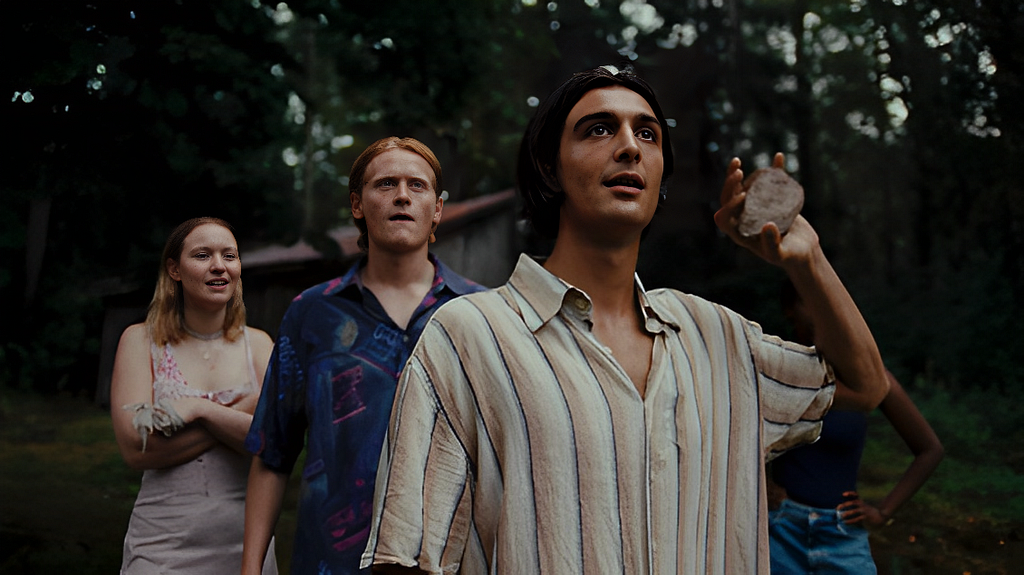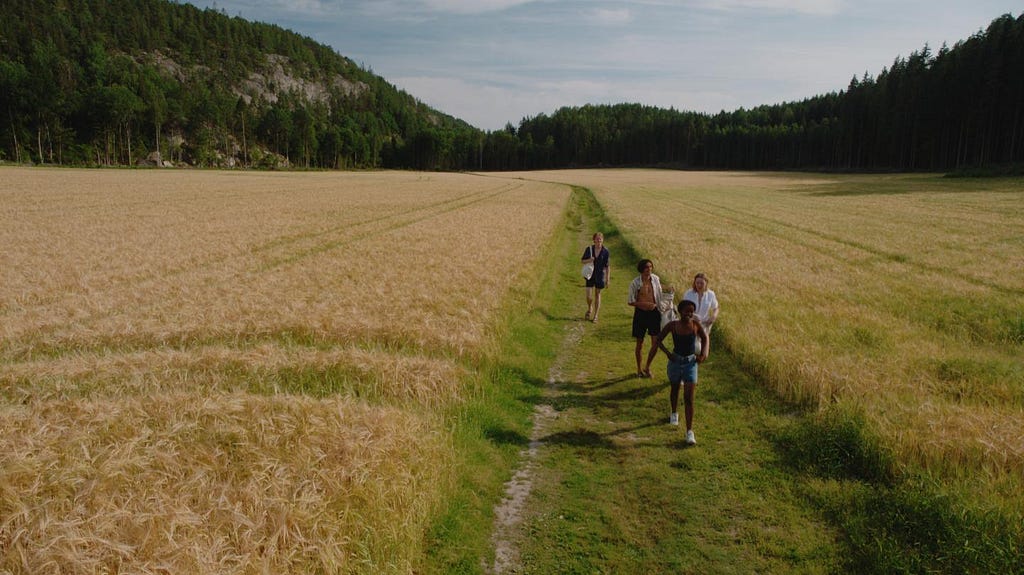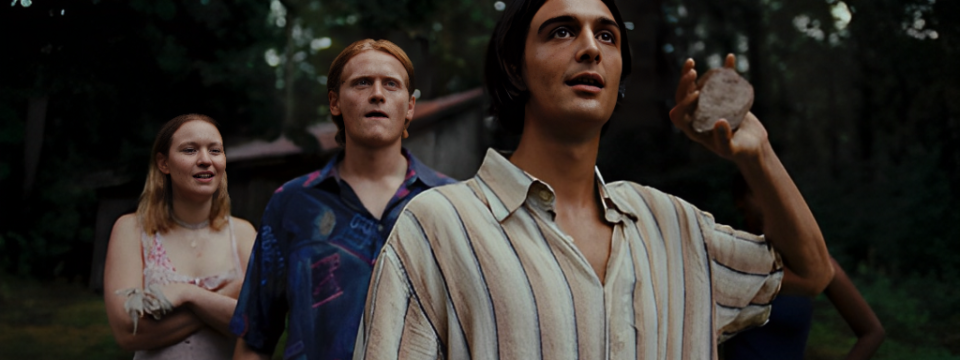Filmmakers Making A Social Impact: Why & How Filmmaker Mauritz Brekke Solberg Is Helping To Change Our World

Making films take a lot of time — I think one of the first things you experience after film school is how much time you spend on giving ideas legs and financing the films, when you can’t ask people to work for free anymore. Even short films can take years getting from an early idea to a finished film.
As a part of our series about “Filmmakers Making A Social Impact” I had the pleasure of interviewing Mauritz Brekke Solberg.
Mauritz Brekke Solberg is known for Juli. (2022), Skeleton Sea: The Tides of Tomorrow (2016) and Birthright (2017).
Thank you so much for joining us in this interview series! Our readers would love to get to know you a bit better. Can you tell us a bit of the ‘backstory’ of how you grew up?
I grew up in a city located in the middle of Norway called Trondheim. I am the oldest of three siblings. My mom’s a teacher and my dad’s a professor in medical ethics. Growing up me and my brother had this hatch on our floor with a slide down to a playing room our dad had built for us. It’s a good picture of a childhood filled with a lot of playfulness.
Can you share a story with us about what brought you to this specific career path?
My dad used to be a hobby photographer, and introduced me and my brother to cameras, both still and video. We spent a lot of time on our big home computer editing these funny little sport videos where we pretended to be really great soccer players. I believe that helped with deciding a high school to apply to, ending up with one that offered a three year study of media and communication. These years really helped build my interest in visual storytelling.
Can you share a funny or interesting story that occurred to you in the course of your filmmaking career?
Well I’m not sure how funny it was at the time but it is definitely funny looking back at: There was this one documentary we shot where halfway through the shoot, two of our subjects had a longer chat with each other off camera. It was only our sound recordist who heard what they said at that time as they had forgotten that their lav-microphones were on. One month later in the editing room we heard that they were discussing if we filmmakers really knew what we were doing, and that we were filming so much bullshit. We knew that right after that conversation we had had a sit down with our subjects where we explained why we were focusing on the things we did. Things got much better after that, and the film turned out great. But hearing this for the first time in the editing room still gave us a combination of chills and laughter.
Who are some of the most interesting people you have interacted with? What was that like? Do you have any stories?
I think I will mention one of our lecturers at our film school. (Lars Daniel Krutzkoff Jacobsen) He is a brilliant lecturer and a real film expert. But at the same time he likes to make what he calls “trash film”. It’s like this genre of film where everything is bad, from the actors to the camerawork, to the screenplay. His films depict human degradation, lust, and taboos in a filmaticly ugly way.
I find this combination of what I would call ‘conflicting interests’ very refreshing.
None of us are able to achieve success without some help along the way. Is there a particular person who you are grateful towards who helped get you to where you are?
I do owe everything to my fellow colleagues and friends in our production company Ferdi Film. We have been pushing each other from the beginning and worked hard to be able to create this space where ideas and creativity can flourish. And I am particularly grateful to my
writing partner Daniel Schwarz for what has been eight years of amazing collaboration. I am looking forward to what we will be able to create in the future.
Can you please give us your favorite «Life Lesson Quote» Can you share how that was relevant to you in your life?
I am not particularly a fan of life lesson quotes, haha. But I do like a certain quote on alpinism (one of my hobbies) that I think applies to all aspects of life, including film making. It’s from the norwegian writer and philosopher Peter Wessel Zapffe. He says: “Alpinism is meaningless, like life itself. Therefore it’s magic can never die.”
As you can guess I am not religious in any way, and I do not believe there is an overall meaning or purpose. But in now way do I think that is a bummer. On the contrary, that is what I think makes the world so interesting. There is so much more to discover, and you have to create that magic on your own.
I am very interested in diversity in the entertainment industry. Can you share three reasons with our readers about why you think it’s important to have diversity represented in film and television? How can that potentially affect our culture?
The first reason I would say is role models. Every young kid watching film and TV is comparing themselves to the heroes or villains they see on the screen. If they only see a certain type of person, that looks a certain way in certain types of characters, they would think that “I can’t be like that, or I shouldn’t be like that”. It’s the same with sports for instance. Every time someone breaks into a sport at the highest level, you suddenly experience a huge amount of recruiting in that country or from the nationality the athlete represents.
The second thing is if we get to see more people of different colors and backgrounds, more actors will see that there is a bigger potential for them getting on screen. That will boost the recruitment which in turn will lead to higher competition which gives higher levels of performances from a wider range of actors.
The third reason is that it is healthy for everyone to be exposed to people of different colors and backgrounds on a daily basis. It changes your mind from thinking so much about “us and them” to seeing everybody as humans. But I do think there is huge potential for doing better. One of the best things I see is when people are cast in a role not because they are supposed to represent a certain group of people, but merely because they are there to represent a character. I really like the trend we are seeing that more people of color are casted in periodic dramas, a genre you could say was reserved for the white because of our history. But it really doesn’t have to be, because what it really is about, is characters, not skin color.
What are some of the most interesting or exciting projects you are working on now?
I am shooting a new short this fall, which will take place in the world of the film advertising industry. It’s a dark comedy based on some self-experienced events. I am also developing a tv-series in the sci-fi genre. I won’t say too much about it but I could say that it’s in the landscape of the Handmaid’s tale.
Which aspect of your work makes you most proud? Can you explain or give a story?
I have a great focus on the visuals in my work, and I always try to explore a new visual element or style in my films. Like in this short “July.” we did a five minute one take. I had played with the idea of doing a one take, but after watching Victoria (2015) by Sebastian Schipper I got convinced that this film needed that. We planned and rehearsed for a continuous fluid and moving take, ending up with the film’s most intense moment. As a first time viewer it can be hard to spot the one take, but you will definitely feel it.

Ok super. Here is the main question of our interview. What are your 5 things I wish someone told me when I first started» and why? Please share a story or example for each.
- Making films take a lot of time
I think one of the first things you experience after film school is how much time you spend on giving ideas legs and financing the films, when you can’t ask people to work for free anymore. Even short films can take years getting from an early idea to a finished film.
2. Make the things you want to see
You could argue that you could or should make films in a certain way to get into the popular festivals, and be strategic in the way you make your films, but for you to be able to dedicate your whole life to this, you need to make films you really want to make. After years of making commercials and films on commission I found it easier to lose interest. So before every project it’s really important for me to find something, no matter how small, that really ignites the passion, so it doesn’t disappear.
3. Everyone gets refusals
Getting my first refusals was really tough, and I don’t think there is a way to prepare you for that except knowing that it happens to everyone all the time. The competition is fierce. But after hundreds of no’s from commercial gigs, public grants, or broadcasters, you get used to it in a way and learn to always keep multiple potential projects running at the same time.
4. Word of mouth is everything
It’s easy to think that grades at school and your CV will take you far in the film industry, and of course your resume is essential, but I didn’t know how much of a ‘work by recommendation’ this industry was before I started. When working on a film, you’re working so intensely with someone that you need to know the things about a person that’s not written on your resume. So what’s better than having recommended someone from someone you really trust. It’s the same way when we hire a team to do our films. We pick a team of people we feel we can trust. A lot of recruiting actually happens at parties or participation in other productions where we can start a relationship before working together on our own projects.
5. Maturing is good for your films
When you start doing films and graduate from the film school you might feel that time is going by really fast, and that the progress in your film career is slow. And it can be slow
compared to other industries. Usually people don’t live off doing features until they are in their forties, and most people don’t live off doing features at all. The point is that filmmaking is about capturing the nuances and complexities in life and telling them in a compelling way to an audience with a short attention span. That’s a hard task. But the more mature you get, the better you’ll be at telling your stories. At least up to a certain age, haha. I’m looking at a script for a tv-show we wrote six years ago. We are rewriting the script now, and I feel much more confident in what I’m writing, and why I’m writing it now, then what I did then.
When you create a film, which stakeholders have the greatest impact on the artistic and cinematic choices you make? Is it the viewers, the critics, the financiers, or your own personal artistic vision? Can you share a story with us or give an example about what you mean?o
I usually write my films together with my writing partner Daniel, so this collaboration will have the biggest impact on how we end up doing things. Then of course it depends on the product we are making. When we make short films there are no clients, usually no investors with creative objections, or viewers we have to please. It’s different with tv-series, commercials or features. I would also say that the DP I am working with has a lot of influence and we usually have a very open dialogue where both come with suggestions. The same things apply in the editing room with the editor. “A film is made three times” is a common saying. First in the writing room, then at the location when shooting, and lastly it’s rearranged and put together for the third time in the editing room.
You are a person of great influence. If you could start a movement that would bring the most amount of good to the most amount of people, what would that be? You never know what your idea can trigger. 🙂
If I could choose to make political decisions I think I would introduce a universal basic income and a mandatory but free university education for the whole world. I truly believe that could turn some of this rising polarization around.
We are very blessed that some of the biggest names in Business, VC funding, Sports, and Entertainment read this column. Is there a person in the world, or in the US whom you would love to have a private breakfast or lunch with, and why? He or she might see this. 🙂
I would love to have lunch with director Denis Villeneuve. He is one of my favorites and a master of his craft.
How can our readers further follow you online?
You can follow me on instagram on @mauritzbs and look up our company @ferdifilm
This was very meaningful, thank you so much! We wish you continued success!
Thank you!
Filmmakers Making A Social Impact: Why & How Filmmaker Mauritz Brekke Solberg Is Helping To Change… was originally published in Authority Magazine on Medium, where people are continuing the conversation by highlighting and responding to this story.
